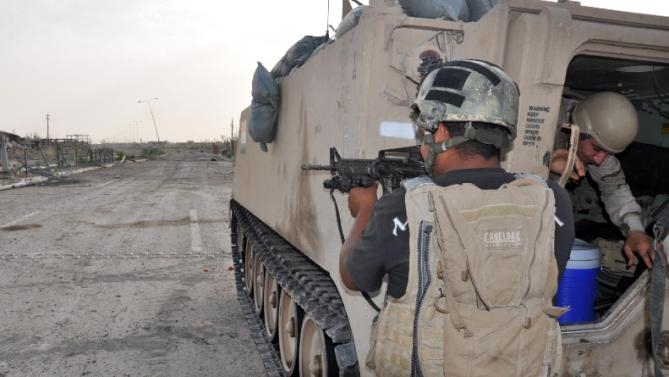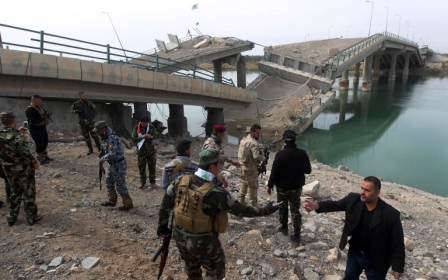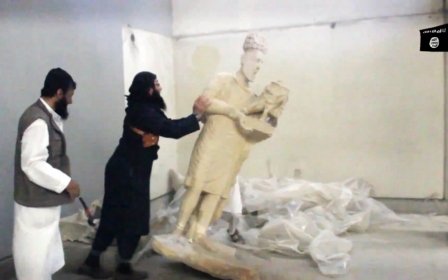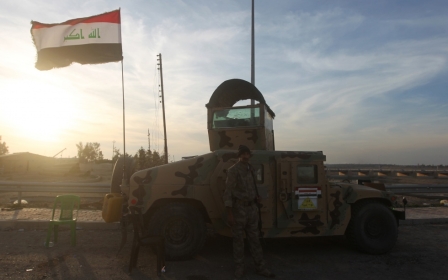Seven killed in Baghdad bombings as Australia pledges 300 troops

At least seven people were killed and 33 others were wounded in bomb blasts across Baghdad on Monday as Australia announced plans to send an additional 300 troops to Iraq.
In one of the bombings, two people were killed and six others were injured after an explosion near a football field in al-Husayniyah in northern Baghdad, while one person was killed and nine were injured after a bomb went off near a shop in al-Mashtal district.
Also, one person was killed and five were wounded in a bomb attack near a market place in al-Dawra district, security sources said.
At least two people were killed and 10 others were injured in an explosion in central Baghdad.
Officials added that at least one person was killed and three others were injured after a handmade bomb exploded on the roadside in the Abu Ghraib area on the outskirts of Baghdad.
Meanwhile, three unidentified male bodies shot in the chest were found in Baghdad’s southern suburb of Yusufiya, according to the security sources.
Prime Minister Haider al-Abadi had lifted Baghdad’s eight-year curfew on 7 February.
Iraq has been gripped by a security vacuum since June 2014 when Islamic State militants stormed the northern province of Mosul and declared a self-styled caliphate in parts of Iraq and Syria.
On Tuesday, Australia announced that it would send another 300 troops to Iraq in a joint mission with New Zealand to help train local forces fighting IS.
The decision follows Wellington last week deciding to deploy some 140 soldiers on a non-combat mission to boost the Iraqi military's ability to fight the IS militants.
Prime Minister Tony Abbott said the decision followed a formal request from the Iraqi and US governments.
"I want to stress that we haven't taken this decision lightly. Ultimately, it is Iraq that must defeat the death cult (IS) but we do not want to leave the Iraqis on their own," he told reporters in Canberra.
"We are naturally reluctant as a peace-loving people to reach out to far-away conflicts but, as we know, this conflict has been reaching out to us for months now."
Some 170 Australian special forces are already in Iraq helping to train government troops, and Abbott said it was in his country's national interest to boost their presence.
"I stress, the death cult has been reaching out to our country with about 100 Australians fighting with Daesh (IS) and other terrorist groups in Syria and Iraq," he said.
"About another 150 here at home are supporting these extremists so this commitment is a matter of domestic as well as international security, and I stress this is absolutely and utterly in Australia's national interests to do this."
The Australian and New Zealand troops are to be based at a military base in Taji, north of Baghdad, from May.
Since August 2014, the US military - along with allies including Australia - has been conducting a campaign of air strikes against militants in Iraq and Syria.
Australia's role is restricted to aerial support, training, advice and intelligence.
The Pentagon said in February that it estimated US-led coalition strikes had killed about 6,000 IS militants in Iraq and Syria since the air campaign began in August.
The number of civilians killed in coalition strikes in Iraq remains unclear.
In Syria, the coalition air strikes have killed at least 62 civilians, according to the Syrian Observatory for Human Rights.
Australia contributed about 2,000 troops to the US-led coalition's war in Iraq from March 2003, until they withdrew in 2009. None died in combat or on operational duty during that deployment.
New MEE newsletter: Jerusalem Dispatch
Sign up to get the latest insights and analysis on Israel-Palestine, alongside Turkey Unpacked and other MEE newsletters
Middle East Eye delivers independent and unrivalled coverage and analysis of the Middle East, North Africa and beyond. To learn more about republishing this content and the associated fees, please fill out this form. More about MEE can be found here.




